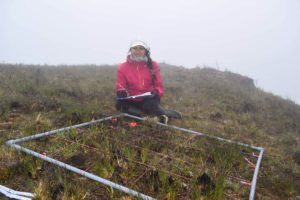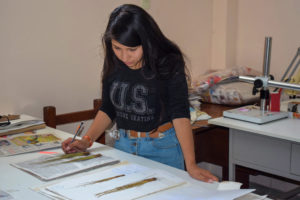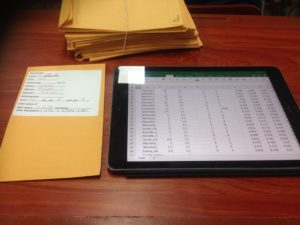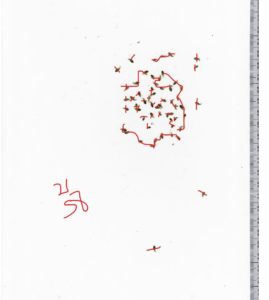a. What is your background? Where are you from? What do you study? What are you most interested in, scientifically?

Hola! My name is Lucely Lucero Vilca Bustamante. I am from Cusco, Perú. I studied Biology at Universidad Nacional de San Antonio Abad del Cusco. At the end of 2019, I finished my Master’s degree in Ecology and Environmental Management at the same university. I am currently doing my Master´s Thesis in functional diversity of Andean Grasslands in the Manu Biosphere Reserve in Peru.
My scientific interests are related to plant community ecology, especially Andean plant communities of Páramo and Puna. I want to understand how the taxonomic and functional communities are responding to different climate warming and human impacts.
b. Give us a brief summary of your internship project. What is the study system? Primary research questions? With whom are you working?
I was lucky enough to participate before in two Functional Traits Courses (PFTC3 – PFTC5), held in Peru, where I learned a lot about functional ecology. I am also participating in the Puna Project where we measured and collected data of functional traits to evaluate the effect of fire on the functional composition of alpine ecosystems across an elevational gradient. Functional traits allow making generalizations about the mechanism underlying community assembly and community responses to environmental disturbances, so, with this project we want to answer the following questions
How are the fires changing the species and functional composition of the Andean grasslands? How is the functional community of the Andean grasslands responding to the occurrence of fires? Is the functional composition of the Andean plant communities responding differently to fire along elevation gradient?
I have been working with Paul Efrén Santos, another Master´s student and intern working in the same project and Julia Chacón-Labella, a postdoctoral researcher at the Enquist´s Lab, in the University of Arizona.
c. What is your role in the research team in terms of tasks and responsibilities, and how do these relate to the aims of the research project?
My main task was cleaning, homogenizing and organizing of data from the Functional Trait Courses (PFTC-3) carried out in Perú in 2018 and 2020 (PFTC-5), and the data from the Puna project in 2019. I primarily worked on taxonomic identification of those species that were not identified in the field. I also worked on the scientific name standardization. Related to the traits, my worked consisted in weighting samples, counting leaves, and preparing and documenting the 2018, 2019 and 2020 databases.
d. What were your specific goals for the upcoming internship? These can be both scientific and personal. Are you meeting, or did you (if the internship is complete) accomplish your goals? Please explain with specific examples if possible.
 My main scientific goal was to improve my data wrangling and data management skills, using R. Regarding my skills in R, I feel that with this internship I have learned and improved a lot. At first I was very afraid of it (coding scared me!), and not coding well caused me constant frustrations. Now, I am not longer afraid of it. Now I see how a useful tool R is when it comes to cleaning and organizing data, especially “tidyverse” and “ggplot2” packages! I’m more confident using these packages and R.
My main scientific goal was to improve my data wrangling and data management skills, using R. Regarding my skills in R, I feel that with this internship I have learned and improved a lot. At first I was very afraid of it (coding scared me!), and not coding well caused me constant frustrations. Now, I am not longer afraid of it. Now I see how a useful tool R is when it comes to cleaning and organizing data, especially “tidyverse” and “ggplot2” packages! I’m more confident using these packages and R.
As a personal goal, I wanted to improve my English-related skills. I still have trouble expressing myself in English, but I think my understanding has improved a lot and that makes me very happy. Becoming fluent in English in very important to continue working in Academia and international research, so having the opportunity of interacting and working in an international group is a bonus for me.
e. What skills or knowledge from your prior experience and education did you find useful during this internship? Did you develop any new skills or knowledge? Please explain
I have worked before in Puna Ecosystems and I have a good knowledge of the Andean flora. I have also participated in the data collection for the Puna Project. All these skills and previous knowledge have helped me enormously in the cleaning and standardization of data. Thanks to there I have been able to identify systematic errors along the databases such as incorrect species identities, or wrongly typed names.
At first, going through all the species names and checking the taxonomic identity of all the samples seemed like an endless task: there was always a small hidden error, or a detail was missing. I had to be very persistent and a perfectionist in that aspect to obtain very clean and trustable data. But finally, we made it and we are now proud of our three Puna datasets.
Thanks to this experience I have improved my data wrangling skills and have felt much more involved as a researcher working in all the data pre-processing behind a good dataset and an ambitious research project.
 f. How has the COVID19 pandemic altered your plans or your experience during this internship?
f. How has the COVID19 pandemic altered your plans or your experience during this internship?
I would have loved to travel to Norway, but due to the problems with the pandemic, it was not possible. However, I appreciated working from the comfort of my home, since ordering the data in a quite environment and having the samples nearby helped me a lot. I also had the support of some colleagues. I am very grateful for such a great opportunity!